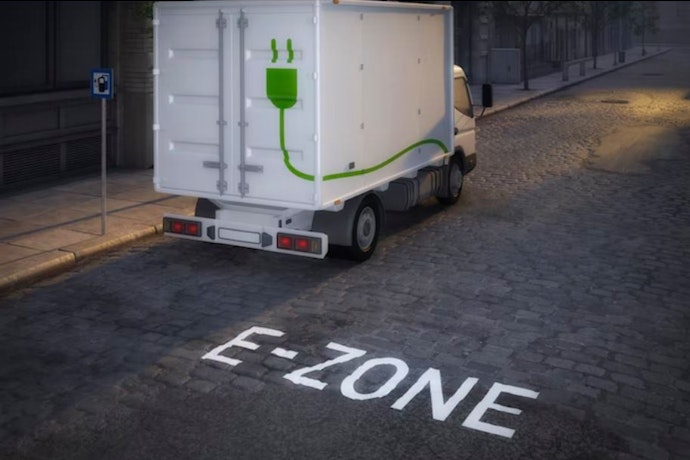Fuel management: 5 ways to cut costs using telematics
Learn how GPS tracking can help reduce fuel costs...
Read more
In 2021, the Biden administration issued two executive orders intended to encourage more widespread adoption of battery electric vehicles (BEVs) in the United States and thereby move the country closer to achieving its net-zero emissions goal.
The first executive order aims to revitalize the flagging electric vehicle (EV) program of the US government, requiring the replacement of the government’s entire fleet of about 650,000 vehicles with US-made electric models. The second executive order set a target for EVs to make up half of all new vehicles sold in the United States in 2030.1
Given that EVs promise to deliver an array of operational and cost benefits to fleets, the accelerating fleet electrification in the industry is not surprising. Let's take a closer look at these and other benefits fleets can gain from embracing electric vehicles.
For fleets, budgets have historically been tight, and cost savings has always been a priority—and in the face of recent global events, the need to tighten margins and gain efficiencies has never been greater.
In fact, "94% of fleet managers say COVID-19 will impact operations more than any single event in the past decade. What’s interesting, however, is that 96% of those with EVs in their fleets feel already prepared to weather a recession, compared to only 72% of non-EV owners.2
The benefits that electric fleet vehicles can offer are likely behind this high percentage. Here are just a few.
The fuel economy of medium and heavy-duty all-electric vehicles and PHEVs is dependent on the load carried and the duty cycle, but under the right applications, all-electric vehicles maintain a strong fuel-to-cost advantage over their conventional counterparts.3
Electric fleet vehicles also don’t require many of the things that require an ongoing cycle of maintenance, such as oil, transmission fluid and spark plugs, and contribute to an overall lower total cost of ownership.
The price of fuel fluctuates nearly weekly, depending on factors such as political conflicts, natural disasters, plant shutdowns and more. It remains a costly and unpredictable line item for fleet owners—one that can change rapidly, but nevertheless is necessary. We’ve seen the frustration that rising fuel costs have caused to individuals and fleets alike.
According to the IEA World Energy Outlook 2021 Executive Summary, even while economies bent under the weight of Covid-19 lockdowns, renewable sources of energy such as wind and solar PV continued to grow rapidly, and electric vehicles set new sales records.4
Given this, fleets that embrace electric fleet vehicles are likely to realize cost savings by switching to electric, eliminating the need for traditional fuels. This helps fleets ensure essential services and operations are not adversely affected by any rapid rises in fuel prices or issues with fuel supply.
Electric fleet vehicles can help reduce greenhouse gas and carbon emissions and support more sustainable practices aimed at slowing climate change. According to the U.S. Department of Energy, EVs emit no tailpipe pollutants, and although the power plant producing the electricity may emit them. Electricity from nuclear-, hydro-, solar-, or wind-powered plants causes no air pollutants.5
Given that today’s organizations are competing in a more sustainability-conscious marketplace, EVs help demonstrate a commitment to operating with greener products and services, while at the same time conserving energy and reducing operating costs.
It would be remiss to talk about EV adoption without mentioning range anxiety, the threat of running out of EV battery charge far from civilization. Luckily, the network of publicly available EV chargers continues to grow apace across the United States. According to the U.S. Department of Energy's Alternative Fuels Data Center, there are currently over 53,505 public EV charging stations in the U.S., with a total of over 134,767 individual (EVSE) charging ports.6
Reaping more benefit from the addition of electric vehicles to a fleet requires the right automated technology to help managers and owners improve productivity.
Automated fleet tracking technology is essential to efficient, cost-effective business operations. Both traditional fleet vehicles and EVs require a platform that allows managers to track the specifics around each vehicle type. For instance, fleet operators need the ability to easily identify EVs among their mixed fleet when viewing location data. They also need visibility into the charging status of each vehicle in order to properly route, schedule and complete jobs, as well as battery temperature and range status.
Better fleet visibility helps you take stock of what you have and how it’s being used. GPS fleet tracking solution can help you uncover hidden costs while revealing potential for greater productivity and efficiency. See it in action.
3 https://afdc.energy.gov/fuels/electricity_benefits.html
4 IEA (2021) World Energy Outlook. https://www.iea.org/reports/world-energy-outlook-2021/executive-summary All rights reserved.
Tags: Fleet utilization, Fuel cost management, Productivity & Efficiency, Vehicle Maintenance




Find out how our platform gives you the visibility you need to get more done.
Learn how GPS tracking can help reduce fuel costs...
Read moreAre you ready for vehicle tracking? Go through our checklist to learn the signs you’re ready to add fleet tracking to...
Read moreThese seven factors have the power to transform businesses that rely on a fleet of mobile workers...
Read moreLearn what's important when evaluating your options for fleet management solutions.
Read more